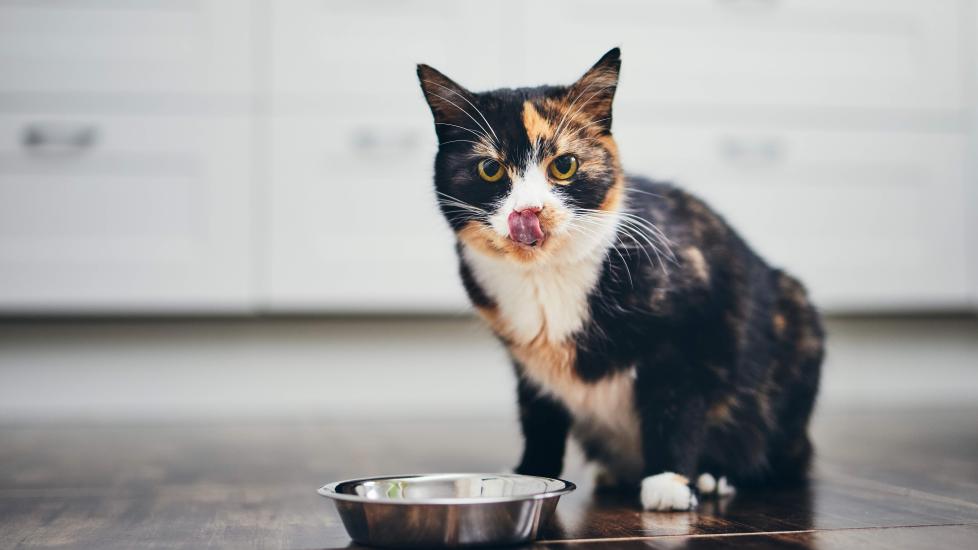Can Cats Be Vegan or Vegetarian?
People choose to eat a vegan or vegetarian diet for many different reasons. And if you’re part of the plant-based lifestyle, you might wonder: Can cats be vegan or vegetarian, too? Is there vegan food for cats?
While vegan and vegetarian cat foods are commercially available, pet parents should think twice before buying them. Here’s why.
Key Takeaways
- Several studies have shown that commercially available vegan cat foods rarely meet all of a cat’s nutritional needs.
- Cats are obligate carnivores, meaning they need nutrients that are available from animal tissues—not from plants.
- It is not a good idea to feed your feline vegetarian or vegan cat food.
Can You Feed a Cat a Vegan Diet?
A vegetarian diet doesn’t include eating animal flesh, but may include products derived from animals, such as eggs, dairy milk, dairy cheese, and butter. A vegan diet is completely plant-based and doesn’t include any animal products.
It’s not advised to put your cat on a plant-based diet. It’s very difficult to make vegetarian—and especially vegan—cat foods that are nutritionally complete and balanced. Why? Cats are obligate carnivores, meaning their anatomy and physiology are designed to get the nutrients they need from animal tissues, not from plants.
This is different from dogs, who are omnivores, meaning they’re designed to eat foods of both animal and plant origins. The feline intestinal tract is significantly shorter than a dog’s, even taking their different body sizes into account. A cat’s intestine-to-body-length ratio is only 4:1, in comparison to the canine ratio, which is 6:1.
Cats have shorter intestines because the animal-based foods they’re designed to eat don’t contain fiber, so they’re easy and quick to digest. Dogs, on the other hand, benefit from a longer intestinal tract that can extract nutrients from plant-based foods. Dogs also have relatively flat molars (teeth at the back of their mouth) that can grind up fibrous food. Cat molars are sharp and made for shearing off pieces of meat.
Additionally, a cat’s pancreas makes less amylase compared to a dog’s. Amylase is an enzyme that breaks down dietary starches that are found only in plants. Cats can handle some starch in their diets, but too much can lead to diarrhea.
Cats are obligate carnivores, meaning their anatomy and physiology are designed to get the nutrients they need from animal tissues, not from plants.
These are just a few of the reasons why cats aren’t meant to be vegetarians or vegans. None of this means that a cat should never eat a vegetable, fruit, or grain (in fact, there are many vegetables and fruits that are safe for cats). But it does mean that, as obligate carnivores, most of a cat’s diet should be animal-based.
Why Is Vegan Cat Food a Bad Idea?
A cat’s high need for protein and for certain amino acids provides more evidence for why cats shouldn’t be vegan.
Adult cats need to eat twice as much protein compared to dogs. The Association of American Feed Control Officials’ (AAFCO) adult maintenance minimum for cats for crude protein on a dry matter basis (meaning the percentage of nutrients in a pet food when all of its moisture has been removed) is 26%. For dogs, it’s only 18%. While it may be possible to meet a cat’s need for protein with a vegetarian diet (particularly if it contains eggs and dairy products), doing so in a healthy manner with a strictly vegan cat food is difficult.
The importance of protein continues down to the level of amino acids, the building blocks of proteins. The amino acid taurine is an excellent example. Dogs can convert other, more commonly available amino acids into taurine. Cats can’t, so they require an ample supply of taurine in their diet. The AAFCO doesn’t even set a minimum level for taurine in dog foods, but they have for cat foods.
Meat and seafood are foods high in taurine, while vegan sources of taurine are hard to come by. Marine algae contain some taurine, but at about one-tenth the concentration available in meat and seafood.
Protein and taurine aren’t the only concerns when it comes to vegan and vegetarian cat foods. Other important nutrients that are provided primarily by animal-based ingredients include:
-
Arachidonic acid (an essential fatty acid)
-
Vitamin A
-
Vitamin B1
-
Vitamin B3
-
Vitamin B12
Several studies have shown that commercially available vegan cat foods rarely meet all of a cat’s nutritional needs. Similarly, homemade diets made from recipes available in books or online are notoriously hard to balance, even when meat is included.
What Are the Risks of Feeding Your Cat Vegan Food?
Cats who eat poorly formulated vegetarian or vegan cat foods are at risk for many different health problems, including:
-
Protein deficiency, leading to poor growth, muscle wasting, poor immune function, and skin and coat problems
-
Taurine deficiency, which can cause hypertrophic cardiomyopathy (a type of heart disease) and poor eyesight
-
Arachidonic acid deficiency, leading to poor growth, coat and skin problems, and a fatty liver
-
Vitamin A deficiency, which can cause skin problems, sores in the mouth, and poor night vision
-
Vitamin B1 deficiency, which is associated with neurologic problems
-
Vitamin B3 deficiency, leading to skin problems, dementia, and diarrhea
-
Vitamin B12 deficiency, which can cause poor growth, weight loss, diarrhea, vomiting, and neurologic dysfunction
Always talk to your veterinarian about your cat’s diet and what you should be feeding them.
Featured Image: Adobe/Chalabala
Help us make PetMD better
Was this article helpful?
